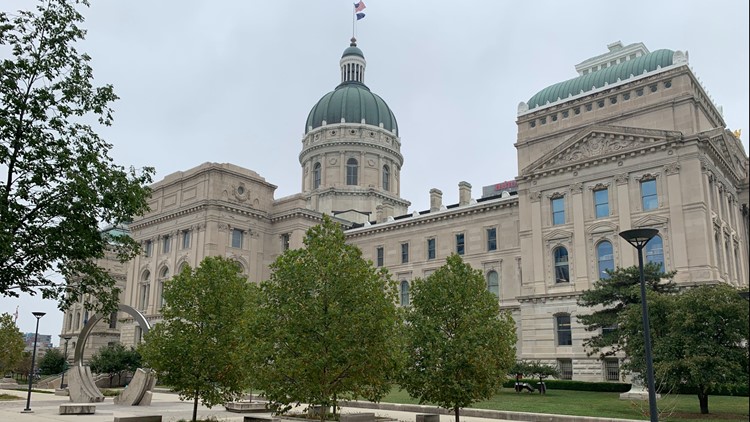DANVILLE, Ind. — Last week I spent about an hour in the law office of State Rep. Greg Steuerwald, a Republican who wanted to talk about something "unbelievable." It was HEA 1006, a sprawling police reform bill that passed and was signed by Gov. Eric Holcomb without a single dissenting vote.
The next day, I met with U.S. Rep. Victoria Spartz at a Carmel coffee shop, asking this freshman Republican what her first impressions of Congress were.
"I didn't have very high expectations from Congress as most American people don’t," Spartz said. "The reason I am saying that was I thought it was going to be like a high school. I was recently talking to a colleague and I said, 'It's more like middle school.'"
Before we moved on to other topics, she was likening Congress to the antics of pre-schoolers.
"It's awful right now," said the former state senator who was elected to the 5th Congressional District last November. "An enormous amount of power is centralized with the speaker. Even Democrats don't have much input at what's happening. There is no work in the committees, no deliberation, no debates. All major legislation goes from her office to the floor."
The contrast between Spartz's narrative and that of Steuerwald's was striking.
Last May, following the murder of George Floyd by a Minneapolis policeman, cities around the nation erupted into protests and violence, including Fort Wayne and Indianapolis. In a conversation shortly thereafter with Porter County Sheriff Dave Reynolds, who is president of the Indiana Sheriffs' Association, Steuerwald explained, "The discussion about George Floyd came up, and Dave says, 'You know, Greg, everything begins with training. Everything we do begins with proper training.'"
That conversation led to a conference call with a number of sheriffs and police chiefs.
"Sen. Eddie Melton was on that call," Steuerwald said of the Gary Democrat. "That kind of started the whole conversation."
As the summer progressed, he had conversations with Indiana State Police Supt. Doug Carter, State Reps. Shackleford and Earl Harris Jr., of the Indiana Black Legislative Caucus, as well as the Fraternal Order of Police.
What resulted was HEA 1006, which will produce $30 million in matching grants for universal police and squad car body cameras, $70 million to enhance de-escalation training at the Indiana Law Enforcement Academy, a redefinition of "chokeholds" in the context of of deadly use of force, and a new process to decertify rogue or "wandering officers." Currently a police officer facing discipline can just quit, then seek employment a county or two over. The new law allows police departments to share an officer's employment record, and offers immunity to sharing agencies.
Steuerwald's mantra was, "As long as I can say on the floor that law enforcement supports all that we're doing, really tightening up this wandering officer stuff, I think we're going to get this done."
HEA 1006 passed 96-0 in the House and 49-0 in the Senate.
"I think it went through every committee, Senate Appropriations, on the floor in the Senate, House Criminal Code, Ways & Means and the floor without a single negative vote," Steuerwald said.
That, in the context of the fallout from the George Floyd murder (the trial of Officer Derek Chauvin was underway during HEA 1006 debate), was extraordinary.
"This proposal is the culmination of months-long work among a bipartisan group of state policymakers, and local and state police departments," Steuerwald said. "Our public safety officials risk their lives to protect our communities, and they need the tools to continue keeping us safe. From improved training to increased accountability to weed out those who delegitimize the profession, these enhancements would help Hoosier police officers better serve and protect us."
"I can't give enough credit to law enforcement, and I can't give enough credit to the Black Caucus, too. They were great, great partners," Steuerwald said.
Sen. Melton called the legislation "historic," adding, "As a Black man in Indiana, seeing this proposal pass with overwhelming unanimous support gives me hope for our future, and I will continue supporting and fighting for legislation that works to improve our criminal justice system."
Senate Minority Leader Greg Taylor added, "HB 1006 is a testament to what we can do when we work together in the best interest of Hoosiers instead of politics."
The obvious difference between the Indiana General Assembly and Congress is that the former is dominated by Republican super majorities, while in Congress, Democrats have tiny House and Senate majorities. But even when Congress was led by large Republican majorities under Presidents George W. Bush and Donald Trump, big things rarely happened. There were scores to settle while umbrage consistently rules.
Rep. Spartz related her trip to the Tex/Mex border in the company of "liberal Democrats" who had invited her along.
"The crisis didn't happen overnight, but it has escalated in the last six month," she said. "I'll tell you why: The situation has been debated and it has been politicized for too long and hasn’t found solutions."
In the context of governance, state legislatures are often seen as the bush leagues compared to the "major league" Congress.
The Indiana General Assembly can be dysfunctional in many ways. But on this topical, high-drama issue, the bipartisanship and coming together of all key stakeholders is true public service that is so lacking in Washington D.C.
The columnist is publisher of Howey Politics Indiana at www.howeypolitics.com. Find Howey on Facebook and Twitter @hwypol.



